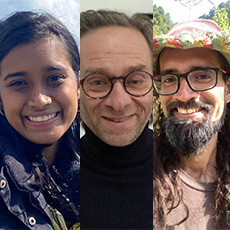The Art and Craft of Music Therapy for Stroke Rehabilitation in a Remote North Indian Community
A Case Study
DOI:
https://doi.org/10.15845/voices.v24i1.3724Palavras-chave:
neurologic music therapy; community music therapy; ecological practices; integral thinking; jugaadResumo
This case study describes how a music therapist (Stephen) and a music therapy intern (Sahitya) worked conjointly with a client and her granddaughter in a remote part of North India. The description provides a unique insight into conditions, culture, and lifestyle in this location, and how these two clinicians were able to merge broader arts-based and holistic approaches, on a journey towards client-centered and functional neurologic music therapy exercises to help the client regain more independence. The background to initial work undertaken by the music therapist, which lasted for one year and eleven months, is followed by a summary of five weekly conjoint sessions with the intern, including the evolution of exercises, rationale, and client responses, illustrated with embedded video excerpts. The communication, relationship, and trust-building with the client and her granddaughter, together with the intern joining the dynamic, paved the way for assimilating music therapy theoretical models that were new to them, and adapting neurologic music therapy approaches using an electronic keyboard that incorporated preferred facilitating music. This resulted in greater client engagement with higher levels of motivation and adherence and increased hand use in daily activities.

Downloads
Publicado
Como Citar
Edição
Seção
Licença
Copyright (c) 2024 Alex Street, Sahitya Rajagopal, Stephen Philip

Este trabalho está licenciado sob uma licença Creative Commons Attribution 4.0 International License.
Articles published prior to 2019 are subject to the following license, see: https://voices.no/index.php/voices/copyright

